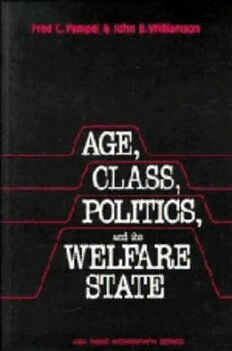
Age, Class, Politics, and the Welfare State (American Sociological Association Rose Monographs) PDF
215 Pages·1989·5.794 MB·English
Most books are stored in the elastic cloud where traffic is expensive. For this reason, we have a limit on daily download.
Preview Age, Class, Politics, and the Welfare State (American Sociological Association Rose Monographs)
Description:
This analysis of the growth of welfare spending examines the relative impact of class and status groups versus demographic composition and political structures. Special attention is given to the role of the aged as representative of the importance of ascription and middle-class groups in welfare growth, and to the effect of welfare spending on income inequality. Aggregate cross-national data from the UN, ILO, and the World Bank are analyzed and the conclusion is drawn that a large aged population, especially in combination with democratic political processes, is a direct and crucial influence on the level of welfare spending.
See more
The list of books you might like
Most books are stored in the elastic cloud where traffic is expensive. For this reason, we have a limit on daily download.
